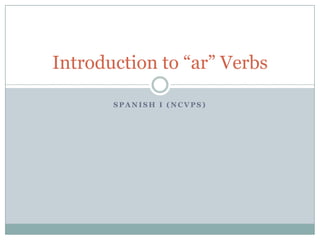
Ar verbs intro
- 1. Introduction to “ar” Verbs SPANISH I (NCVPS)
- 2. What is a verb? Verbs allow you to talk about what you and others do. Examples of action verbs in English include: run, talk, eat, study, etc.
- 3. Verbs in Spanish In Spanish, all verbs end in the letters “ar”, “er”, or “ir”. In this course, we will learn “ar” verbs first. Verbs in Spanish are POWERFUL. For example, you can tell the following just by looking at the verb in Spanish: What the action is (root) When the action takes place (tense) We’ll be studying the present tense. Who does the action (subject) In Spanish, you can even have a one-word sentence! For example: “Canto.” = “I sing.” “I do sing.” “I am singing.”
- 4. How to conjugate a verb It’s as easy as this three-step process! 1. Start with the unconjugated form of the verb (called the “infinitive”): CANTAR 2. Drop the ending “-ar”. What is left is the root: CANT- 3. Add the appropriate ending to the stem based on who the subject is: O, AS, A, AMOS, ÁIS, AN
- 5. Example with “cantar” Spanish English (yo) canto (nosotros) cantamos I sing we sing (nosotras) cantamos you (inf.) sing y’all (inf.) sing (tú) cantas (vosotros)* cantáis he sings they sing (vosotras)* cantáis she sings y’all sing (él) canta (ellos) cantan you (form.) sing (ella) canta (ellas) cantan (usted) canta (ustedes) cantan *Remember that vosotros(-as) is only used in Spain. It is an informal way of expressing “you all.” In other parts of the world, ustedes is used to say “you all” (both formally and informally).
- 6. Now YOU try! Conjugate the verb “hablar” in the space below: yo nosotros(-as) tú vosotros(-as) él/ella/Ud. ellos(-as)/Uds.
- 7. Now YOU try! Conjugate the verb “hablar” in the space below: yo hablo nosotros(-as) tú vosotros(-as) él/ella/Ud. ellos(-as)/Uds.
- 8. Now YOU try! Conjugate the verb “hablar” in the space below: yo hablo nosotros(-as) tú hablas vosotros(-as) él/ella/Ud. ellos(-as)/Uds.
- 9. Now YOU try! Conjugate the verb “hablar” in the space below: yo hablo nosotros(-as) tú hablas vosotros(-as) él/ella/Ud. habla ellos(-as)/Uds.
- 10. Now YOU try! Conjugate the verb “hablar” in the space below: yo hablo nosotros(-as) hablamos tú hablas vosotros(-as) él/ella/Ud. habla ellos(-as)/Uds.
- 11. Now YOU try! Conjugate the verb “hablar” in the space below: yo hablo nosotros(-as) hablamos tú hablas vosotros(-as) habláis él/ella/Ud. habla ellos(-as)/Uds.
- 12. Now YOU try! Conjugate the verb “hablar” in the space below: yo hablo nosotros(-as) hablamos tú hablas vosotros(-as) habláis él/ella/Ud. habla ellos(-as)/Uds. hablan
- 13. ¿Qué llevan? FOR THE FOLLOWING SLIDES, USE THE CORRECT FORM OF THE VERB “LLEVAR” TO SAY WHAT VARIOUS PEOPLE WEAR IN CERTAIN WEATHER CONDITIONS.
- 14. ¿Qué llevan? María y yo ___ unos guantes porque (because) nieva.
- 15. ¿Qué llevan? María y yo llevamos unos guantes porque (because) nieva.
- 16. ¿Qué llevan? Luis y Roberto ___ una chaqueta porque está nublado.
- 17. ¿Qué llevan? Luis y Roberto llevan una chaqueta porque está nublado.
- 18. ¿Qué llevan? Vosotros ___ unas gafas de sol porque hace mucho sol.
- 19. ¿Qué llevan? Vosotros lleváis unas gafas de sol porque hace mucho sol.
- 20. ¿Qué llevan? Ud. ___ un abrigo porque hace frío.
- 21. ¿Qué llevan? Ud. lleva un abrigo porque hace frío.
- 22. ¿Qué llevan? Yo ___ una bufanda porque hace viento (it’s windy).
- 23. ¿Qué llevan? Yo llevo una bufanda porque hace viento (it’s windy).
- 24. ¿Qué llevan? Tú ___ un impermeable porque llueve.
- 25. ¿Qué llevan? Tú llevas un impermeable porque llueve.
- 26. Preguntas personales ANSWER THE FOLLOWING QUESTIONS IN SPANISH. USE COMPLETE SENTENCES.
- 27. Preguntas ¿Tocas la guitarra?
- 28. Preguntas ¿Tocas la guitarra? Sí, toco la guitarra. No, no toco la guitarra.
- 29. Preguntas ¿Patinas en el parque?
- 30. Preguntas ¿Patinas en el parque? Sí, patino en el parque. No, no patino en el parque.
- 31. Preguntas ¿Miras la televisión mucho?
- 32. Preguntas ¿Miras la televisión mucho? Sí, miro la televisión. No, no miro la televisión.
- 33. Preguntas ¿Andas en bicicleta o (or) en patineta?
- 34. Preguntas ¿Andas en bicicleta o (or) en patineta? Ando en bicicleta. Ando en patineta.
- 35. Preguntas ¿Hablas por teléfono o mandas (mandar = to send) texts?
- 36. Preguntas ¿Hablas por teléfono o mandas (mandar = to send) texts? Hablo por teléfono. Mando texts.
